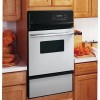GE JGRP20SENSS Use and Care Manual - Page 17
Operating Instructions
 |
UPC - 084691178484
View all GE JGRP20SENSS manuals
Add to My Manuals
Save this manual to your list of manuals |
Page 17 highlights
Safety Instructions Operating Instructions Using the broiling feature. GEAppliances.com ■ For best results, use a pan designed for broiling. It is designed to minimize smoking and spattering by trapping the juices in the shielded lower part of the pan. NOTE: Always broil with the oven door closed. ■ For steaks and chops, slash fat evenly around the outside edges of the meat. To slash, cut crosswise through the outer fat surface just to the edge of the meat. Use tongs to turn the meat over to prevent piercing the meat and losing juices. ■ If desired, marinate meats or chicken before broiling. Or brush with barbecue sauce last 5 to 10 minutes only. ■ When arranging the food on the pan, do not let fatty edges hang over the sides because the dripping fat will soil the oven bottom. ■ The broiler does not need to be preheated. However, for very thin foods, or to increase browning, preheat if desired. ■ Use LO Broil to cook foods such as poultry or thick pork chops evenly without over-browning them. ■ Frozen steaks can be broiled by positioning the rack at next lowest rack position and increasing cooking time given in this guide 11⁄2 times per side. Broiling Guide The size, weight, thickness, starting temperature, and your preference of doneness will affect broiling times. This guide is based on meats at refrigerator temperature. †The U.S. Department of Agriculture says "Rare beef is popular, but you should know that cooking it to only 140°F means some food poisoning organisms may survive." (Source: Safe Food Book, Your Kitchen Guide, USDA Rev. June 1985.) Food Ground Beef Well Done Beef Steaks Rare† Medium Well Done Rare† Medium Well Done Chicken Breasts Lobster Tails Fish Fillets Salmon Fillets Pork Chops Well Done Lamb Chops Medium Well Done Medium Well Done Quantity and/ or Thickness 1 lb. (4 patties) 1/2 to 3/4″ thick 1″ thick (1 to 11⁄2 lbs.) 11⁄2″ thick (2 to 21⁄2 lbs.) Boneless Bone-In 2-4 (6 to 8 oz. each) 1/4 to 1/2″ thick (1 lb.) 1″ thick 2 (1/2″ thick) 2 (1″ thick) about 1 lb. 2 (1″ thick) about 10-12 oz. 2 (11⁄2″ thick) about 1 lb. Rack First Side Second Side Position Time (min.) Time (min.) Comments C 11-12 8-9 Space evenly. Up to 8 patties take about the same time. B B B B B B A A A or B B B B B 8 12-13 13 10 15 25 18-20 28-30 13-16 7-8 18-20 10-12 12-13 5 5-6 8-9 6-7 9-12 16-18 12-15 10-13 Do not turn over. 5 Skin side down Do Not Turn 4-5 6-8 Steaks less than 1″ thick cook through before browning. Pan frying is recommended. Slash fat. Reduce times about 5 to 10 minutes per side for cut-up chicken. Brush each side with melted butter. Broil with skin-side-down first. Cut through back of shell, spread open. Brush with melted butter before broiling and after half of broiling time. Handle and turn very carefully. Brush with lemon butter before and during cooking, if desired. Preheat broiler to increase browning. Slash fat. B 8 B 10 4-7 Slash fat. 10 B 10 4-6 B 17 12-14 Troubleshooting Tips Consumer Support 17















